This may be the world's largest ever gathering of Satanists - and it's about to begin at a Marriott hotel in downtown Boston.
In a candle-lit room set aside for Satanic ceremonies, a neon sign welcomes you to The Little Black Chapel. A raised altar stands at one end, a white pentagram on the floor in front of it.
The ritual being performed here is an "unbaptism", in which participants symbolically reject religious rites performed when they were children.
"No names," says a Satanist who agreed to let me witness their ceremony, as long as they aren't identified.
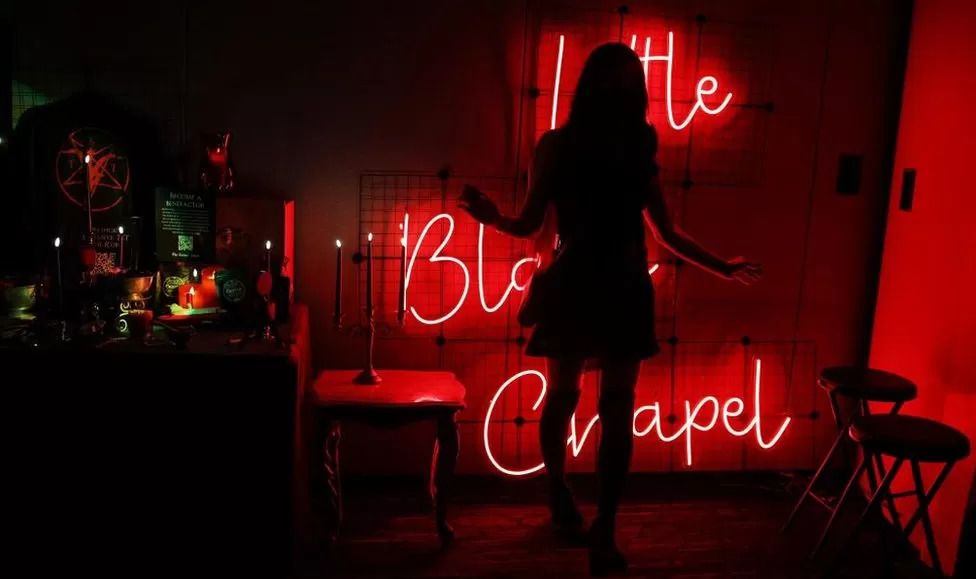 Inside the Little Black Chapel, at The Satanic Temple's annual convention
Inside the Little Black Chapel, at The Satanic Temple's annual convention
They wear a floor-length, hooded cloak and a black face mask. Their hands are bound with rope, which is then cast off to represent liberation. Pages are torn out of a Bible to symbolise overturning their Christian baptism.
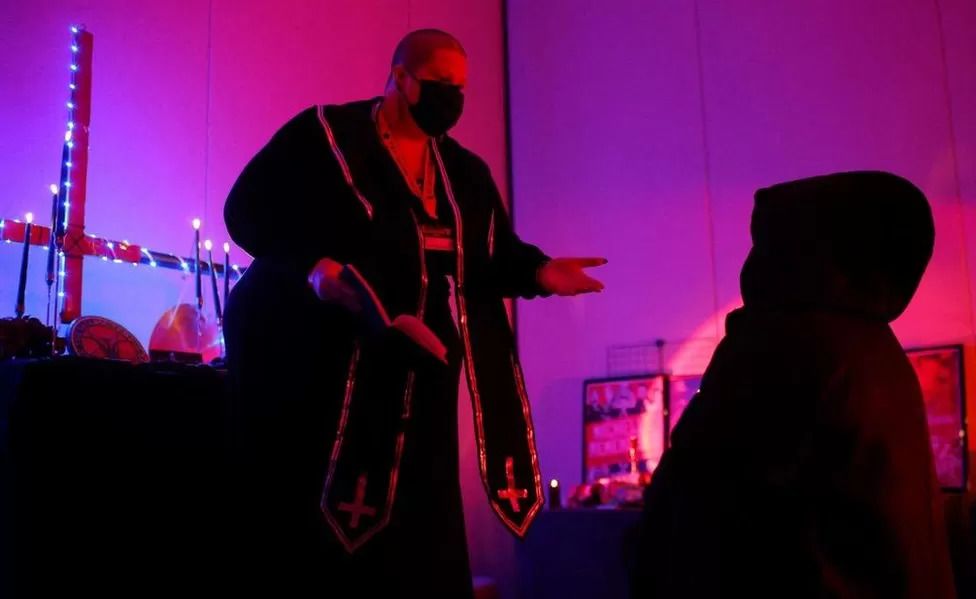 Minister Rose d'Arc performs an Unbaptism Ceremony for an attendee in the Little Black Chapel
Minister Rose d'Arc performs an Unbaptism Ceremony for an attendee in the Little Black Chapel
It's clear the experience was powerful for them.
"As a gay child, being told you are an abomination and should be destroyed, warped a lot of my thinking. Finding The Satanic Temple has really helped me embrace logic and empathy."
The Satanic Temple is recognised as a religion by the US government, and has ministers and congregations in America, Europe and Australia.
More than 830 people snapped up tickets for its late April convention, dubbed SatanCon.
Members say they don't actually believe in a literal Lucifer or Hell. Instead, they say Satan is a metaphor for questioning authority, and grounding your beliefs in science. The sense of community around these shared values makes it a religion, they say.
They do use the symbols of Satan for rituals - for example when celebrating a wedding or adopting a new name. That might include having an upside-down neon cross on your altar while shouting: "Hail Satan!"
For many Christians, this is serious blasphemy.
"That's not wrong," agrees Dex Desjardins, a spokesperson for The Satanic Temple. "A lot of our imagery is inherently blasphemous.
"We've got folks who wear inverted crosses. And our opening ceremony did have the ripping up of a Bible as a symbol of oppression, especially oppression of LGBTQ folk and women, and also the BIPOC community, and pretty much anybody who's grown up with religious trauma, which is a tremendous number of our members."
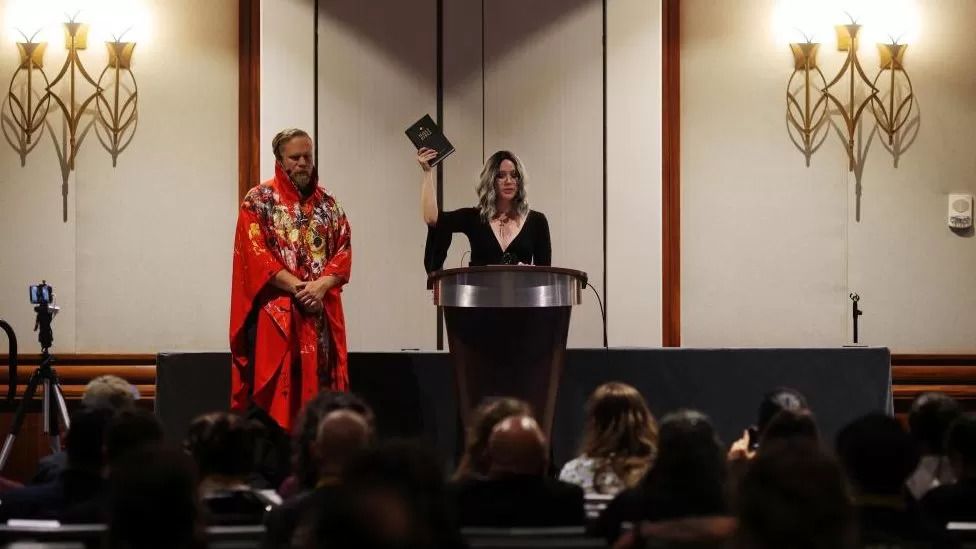 SatanCon's opening ceremony featured pages being torn out of a Bible - which drew the wrath of critics online
SatanCon's opening ceremony featured pages being torn out of a Bible - which drew the wrath of critics online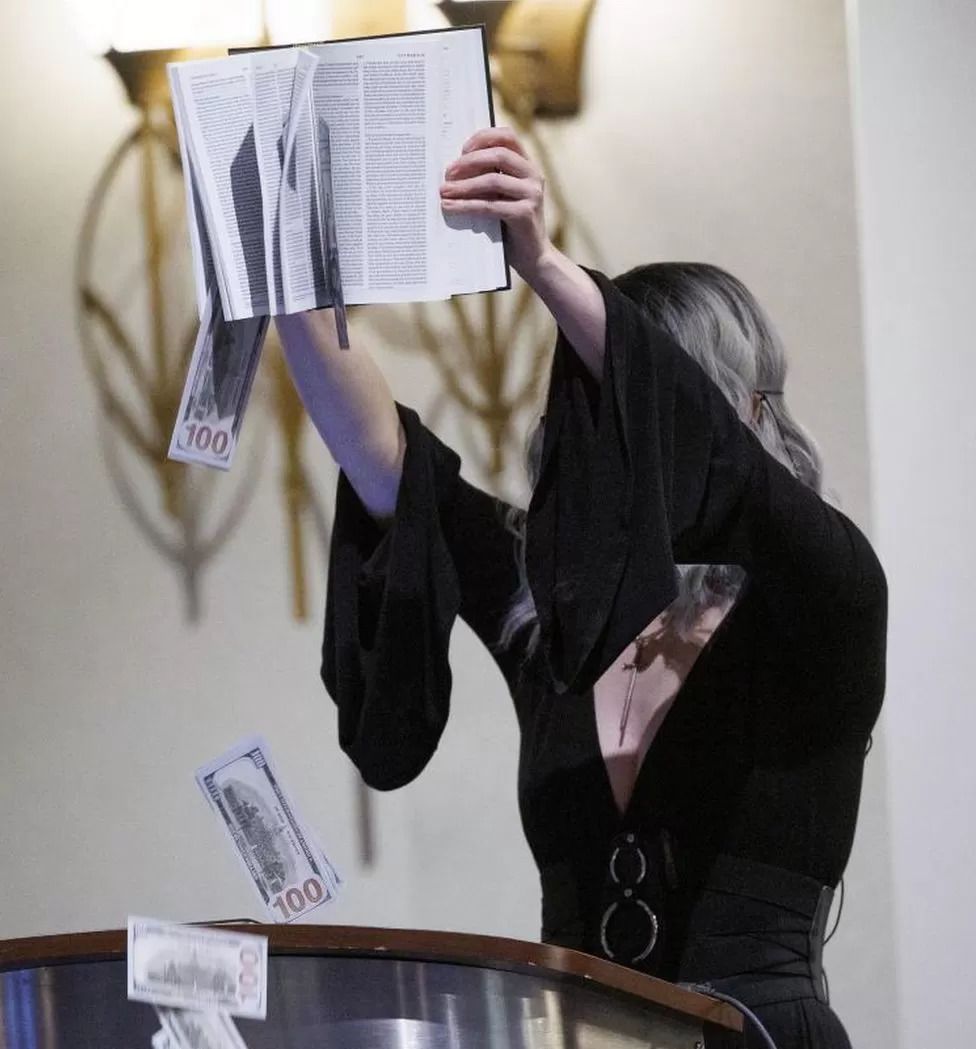 Members of the Satanic Temple know their use of Christian materials is
blasphemous to some people, but say they aren't setting out to upset
anyone
Members of the Satanic Temple know their use of Christian materials is
blasphemous to some people, but say they aren't setting out to upset
anyone
The Satanists say they respect everyone's right to choose their faith, and they're not trying to upset people.
But Christian protesters from many denominations have gathered outside the hotel, carrying signs warning of damnation.
"Repent and believe the Gospel," urges one. "Satan rules over all the children of pride," says another - the letters of "pride" shaded in the rainbow colours of the LGBTQ Pride flag.
"We are hoping to show God that we do not accept this blasphemy, and that we Catholics have not abandoned the public square to Satanists," says protester Michael Shivler, from a conservative Catholic group.
Convention-goers in the lobby eye the protest outside. "They called us 'dope-smoking masturbators'," one man reports. "Oooh, sky daddy is mad with me!" someone else jokes.
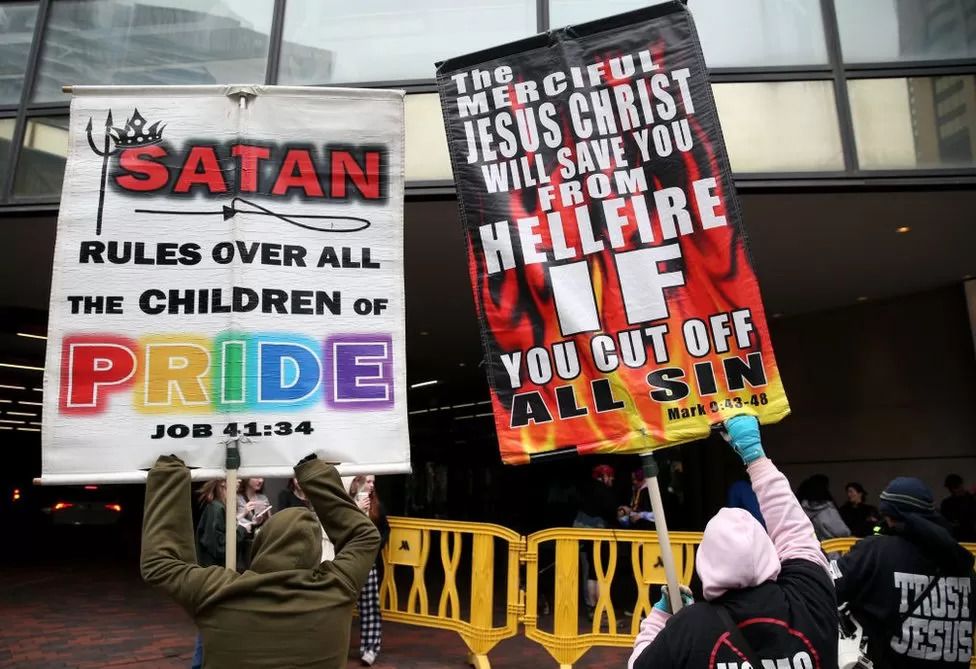 Protestors hold up signs outside the hotel hosting SatanCon
Protestors hold up signs outside the hotel hosting SatanCon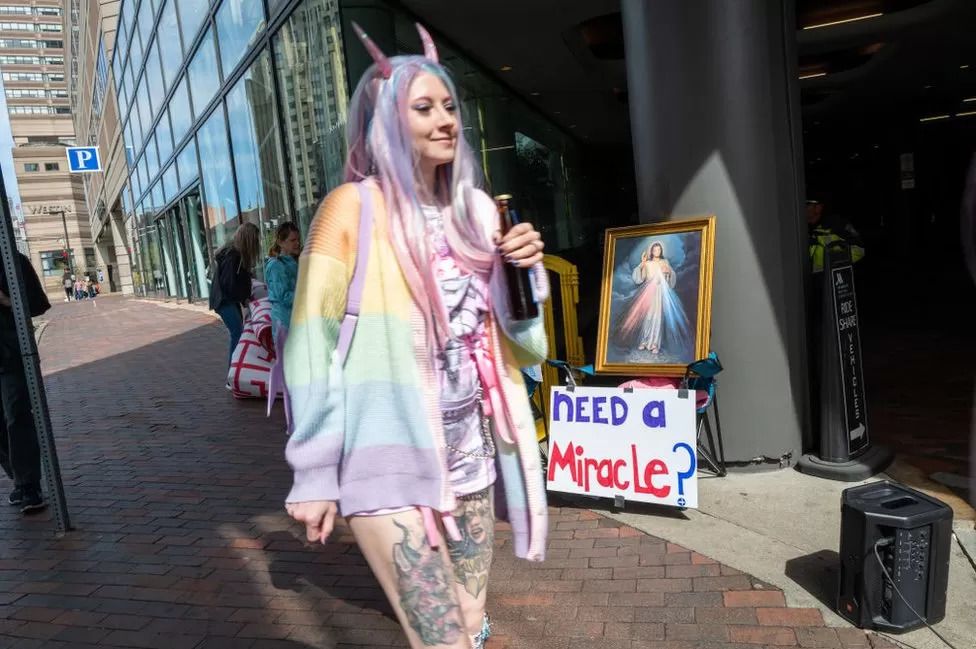 Responses to the protests ranged from apathy to glee
Responses to the protests ranged from apathy to gleeHellbillies, horns, and Satanic self-pleasure
The event takes up the whole fourth floor of the hotel. The Satanists fill it with androgynous goth chic, flamboyant robes, hand-painted horns, diabolical tattoos, and high-maintenance moustache choices.
Most people here are old enough to be parents, and several are. I spot at least one pushchair.
Presentations are given, including one called "Hellbillies: Visible Satanism in Rural America", and a seminar on Satanism and self-pleasure.
 Some attendees wore their normal street clothes to the convention. Others added a little extra
Some attendees wore their normal street clothes to the convention. Others added a little extra
Political activism is a core part of The Satanic Temple's identity. It believes religion and the state should be kept separate, and frequently files lawsuits in the US to defend the distinction. Their point is serious, but they relish bringing satire and outrageousness to the fight.
In Oklahoma, for example, they asked to erect an 8ft (2.4m) Satanic statue at the state capitol when a monument of the Ten Commandments was put up, noting that the First Amendment requires all religions to be treated equally. (The Commandments were ultimately removed after a court battle.)
The Temple also advocates for abortion access, arguing that everyone should have autonomy over their own body.
Earlier this year, it opened an online clinic based in New Mexico, which provides abortion pills by mail.
It has also developed an abortion ritual for people terminating a pregnancy - which is designed to be comforting and involves reciting an affirmation before the abortion - and argues its members must be religiously exempt from abortion bans that would stop them performing it.
That rationale has drawn criticism from some quarters, including in Catholic newspaper the National Catholic Register which called the ritual "nothing more than a grotesque parodying of religious rituals and symbols".
The Yellowhammer Fund, which finances low-income people seeking abortions, declared that "putting your dollars and trust in grassroots organisations that have been doing this work for decades" was a better way to support abortion access.
In a hall packed with supporters, the directors of TST's campaigns present updates on their work. Successes are greeted with whoops, applause, and the sign of the horns.
Another project drawing headlines is After School Satan Clubs - slogan: "Educatin' with Satan". The Temple would rather keep religion out of schools, but wants to counter faith groups coming in to evangelise to pupils.
So where local people have asked it to, it tries to launch an After School Satan Club, focused on community service, science, crafts and critical thinking.
Opponents say it's frightening children, but TST says its content is demon-free. They have a kids' song - My Pal Satan - with a bopping animated goat, and the lines: "Satan's not an evil guy, he wants you to learn and question why. He wants you to have fun and be yourself - and by the way there is no hell."
'Satan loves you!'
Dozens of artists and vendors have set up stalls to sell Satanically inspired crafts. They have everything from "Satan Loves You!" beanies, to crocheted toys modelled on the Baphomet - a goat-headed Satanist symbol with wings.
The Satanic Temple is selling its own T-shirts too. The group doesn't take membership fees, and is kept running largely off donations and merch sales.
A newly launched children's book, titled Goodnight Baphomet, draws coos from bystanders.
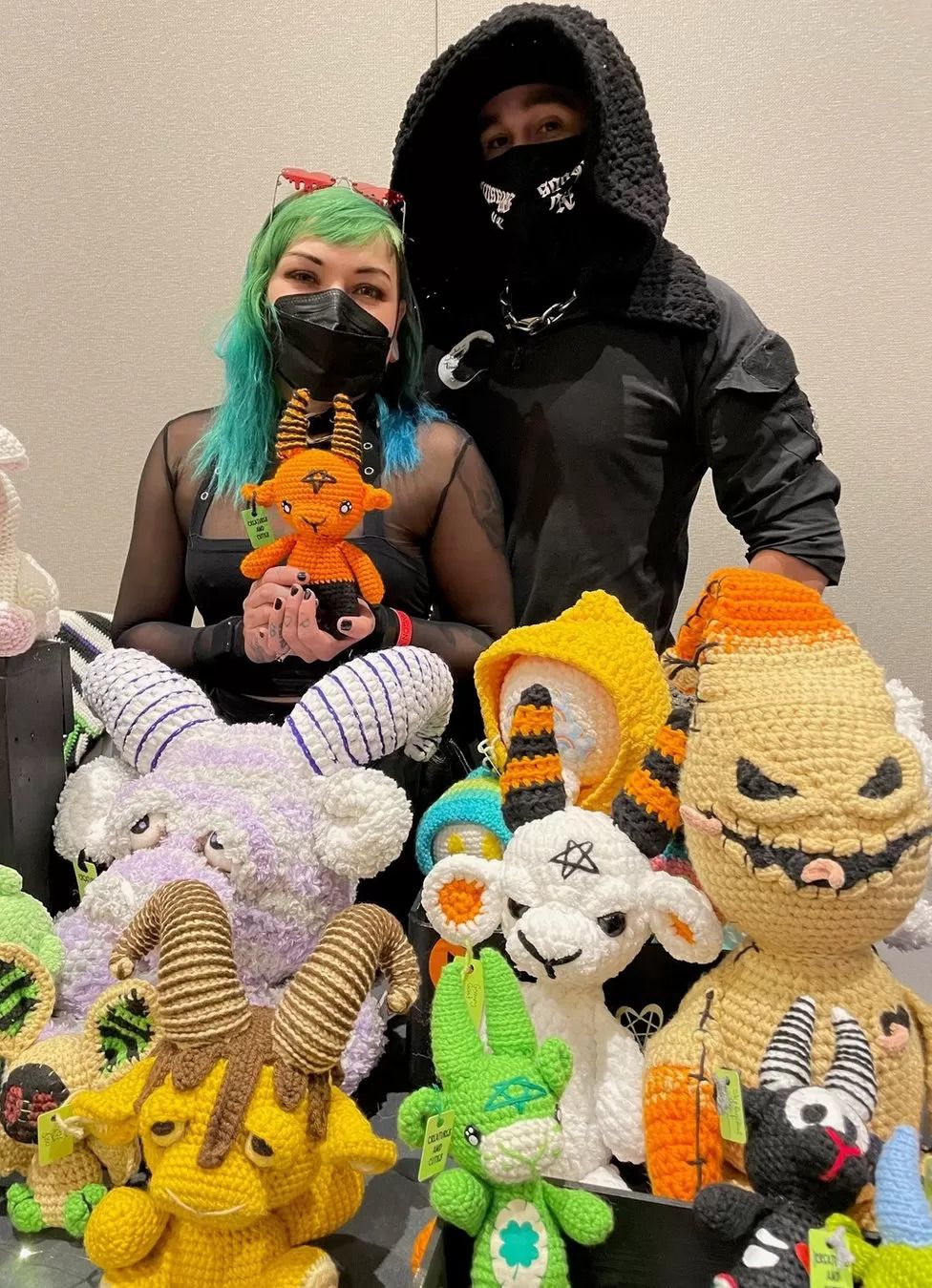 One seller who goes by Little Nicky sells crocheted toys with a Satanic twist
One seller who goes by Little Nicky sells crocheted toys with a Satanic twist
The Satanic Temple's code of guiding principles - the Seven Tenets - prioritises empathy, control over one's own body, and respect for other people's freedoms, including the freedom to offend.
Translate that into a kids' book, and it includes rhymes like: "Respect everyone's right to be, especially when they disagree. If their words make you mad, set them free - don't be sad!"
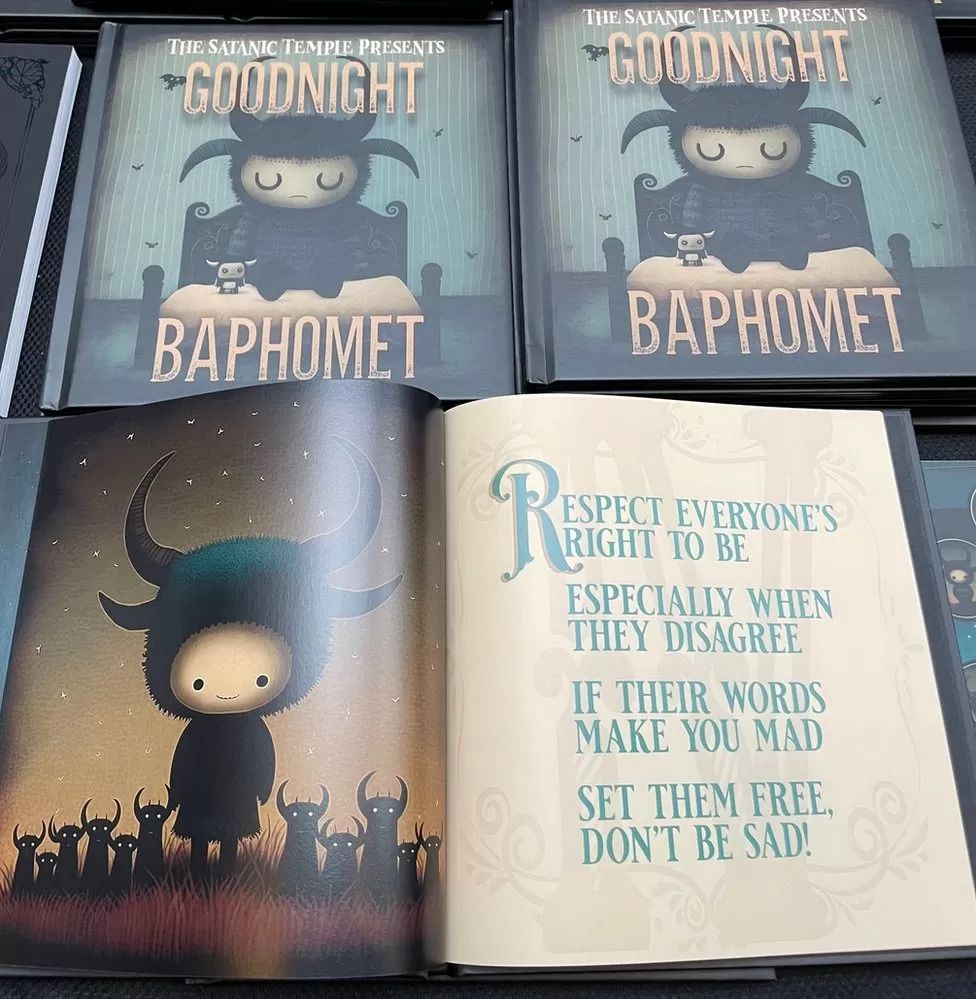 The children's book Goodnight Baphomet charmed attendees
The children's book Goodnight Baphomet charmed attendees
Araceli Rojas, who flew from California to be here, finds the tenets relatable and easy to apply.
"I feel like I've always been quote-unquote a Satanist, I just didn't know it."
She says she first learned about TST through TikTok in 2020. "At that point I looked into it. A little scared, I think, like most would be. And I really wanted to make sure that they weren't sacrificing babies! Then I started getting into the culture, and the scene, and I started to join meetings… and eventually I realised no, they're not, it's just a symbol that they use and it's genuinely really good people."
Chatting around the merch stalls, many people say their intro to The Satanic Temple came from the 2019 documentary Hail Satan?, directed by Penny Lane, which explores the Temple's principles and early activism.
TST says it boosted membership from perhaps 10,000 in 2019, to more than 700,000 today.
Those gathered in Boston include local government staff, medics, engineers, artists, people in finance, a social worker, a therapist, and a circus performer. Many belong to the LGBTQ community. Plenty are married to Christians - or at least to non-Satanists.
Members tend to lean to the left politically, but there's no political test to join and the Temple will not endorse any party or candidate.
Lucien Greaves, The Satanic Temple's co-founder, arrives with personal security, dressed in black and carrying a Thermos. "English breakfast tea. I got it from a shop that sells British stuff." He smiles when I accidentally say "bless you!"
Greaves (a pseudonym) started the movement a decade ago with a friend, Malcolm Jarry (also a pseudonym). They shared a commitment to religious freedom, and opposing what they see as Christianity encroaching on legislation.
 Lucien Greaves, co-founder of The Satanic Temple, says it was never a
prank project - despite their willingness to use satire and shock value
Lucien Greaves, co-founder of The Satanic Temple, says it was never a
prank project - despite their willingness to use satire and shock value
News outlets, especially in the US, often present The Satanic Temple as attention-seeking pranksters pretending to be a religion, something he strongly objects to.
"People are hesitant to take anything we say at face value, but I feel like everything we say is pretty straightforward and we're not misrepresenting ourselves at all."
If you're trying not to look like trolls, was it wise to name your abortion clinic "Samuel Alito's Mom's Satanic Abortion Clinic", after the Supreme Court judge who backed the decision to remove the federal right to abortion? And then put it on a T-shirt?
 The Satanic Temple defends giving its abortion clinic an openly trollish name
The Satanic Temple defends giving its abortion clinic an openly trollish name
"Part of the consideration was refusing to yield to this idea that everything must be sober and humourless to be authentic at all," says Greaves.
"My thinking on that was - nothing could be more serious than us opening a telehealth clinic. I just would hate to see us lose any sense of humour." Greaves has had to adjust his life to deal with the personal risks he faces as America's most prominent Satanist.
"I moved at some point within the past four years and I don't even have people over, because I don't want to have to move again."
Some TST members feel unable to acknowledge openly that they're involved, citing risks to their safety. Members who have been outed have lost their jobs, lost their children in custody battles, and found fake bombs under their cars.
Chalice Blythe, spokesperson for the Temple's religious reproductive rights campaign, received online harassment in the middle of SatanCon, after footage went viral of her tearing a Bible during the opening ceremony.
It's not the first time she's been threatened. In 2016, a family member leaked her details online and a gunman turned up at her home.
The gunman "said 'this is what I'm here to do - I have this gun with that bitch's name on it.' I know they went to jail.
"Legally changing my name, I've had to do that."
As far as she's concerned, it's worth it. "If my enemies are people of a crazy evangelical mindset who want to take my rights away - those are the kind of enemies I'm proud to have."
 Chalice Blythe says after 10 years as a public Satanist, she's no longer surprised by threats and harassment
Chalice Blythe says after 10 years as a public Satanist, she's no longer surprised by threats and harassment
Typhon Nyx, in his 30s, is one of many TST members who uses an alternative name in the community - a "Satanym", as they call it. He says he moved from atheism to Satanism only recently.
"Satanism stands for everything I believe in," he says. "Including bodily autonomy, compassion, respect, science. And Satan represents those who were cast out, those who think differently.
"I never found my friends being accepted in the Christian circles. The appeal of Satan is that he is the accepting one, the inclusive one, and someone I can more identify with.
"Although, I don't believe he actually exists."















